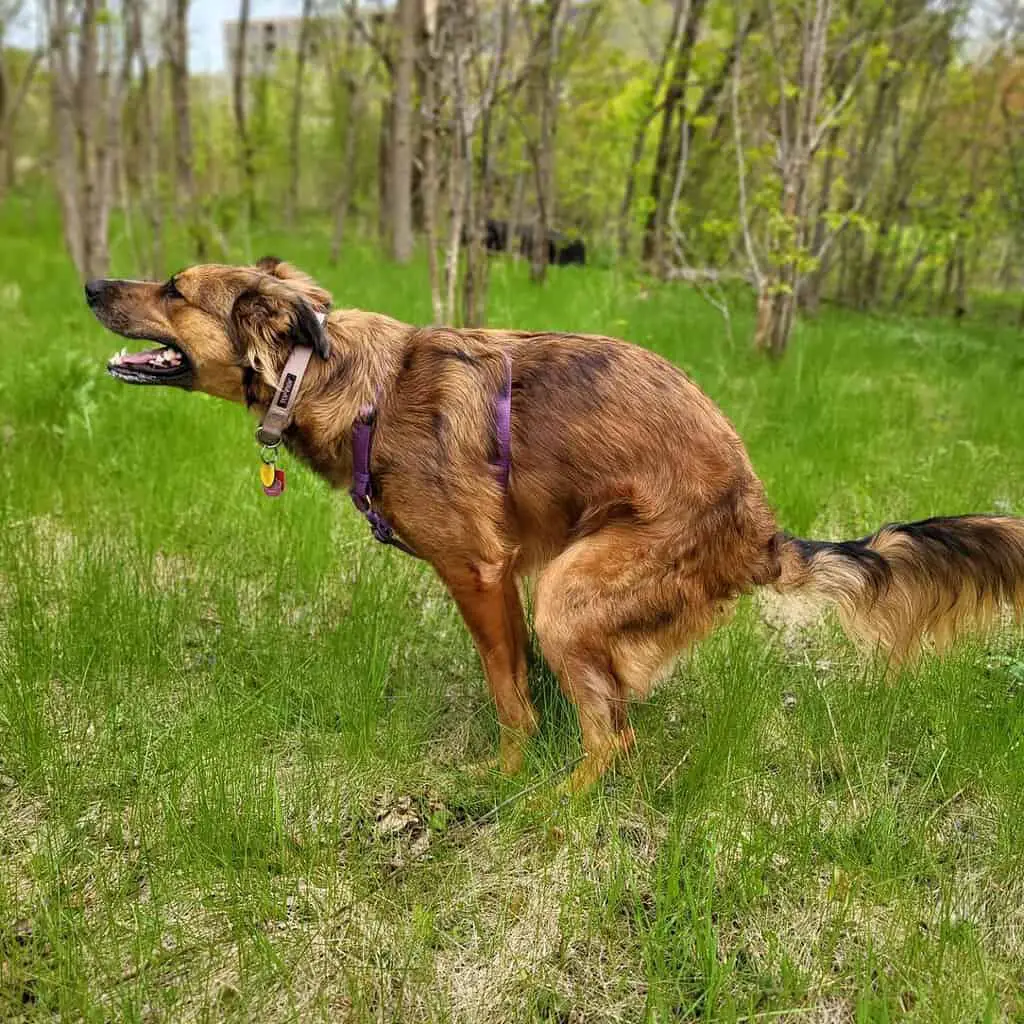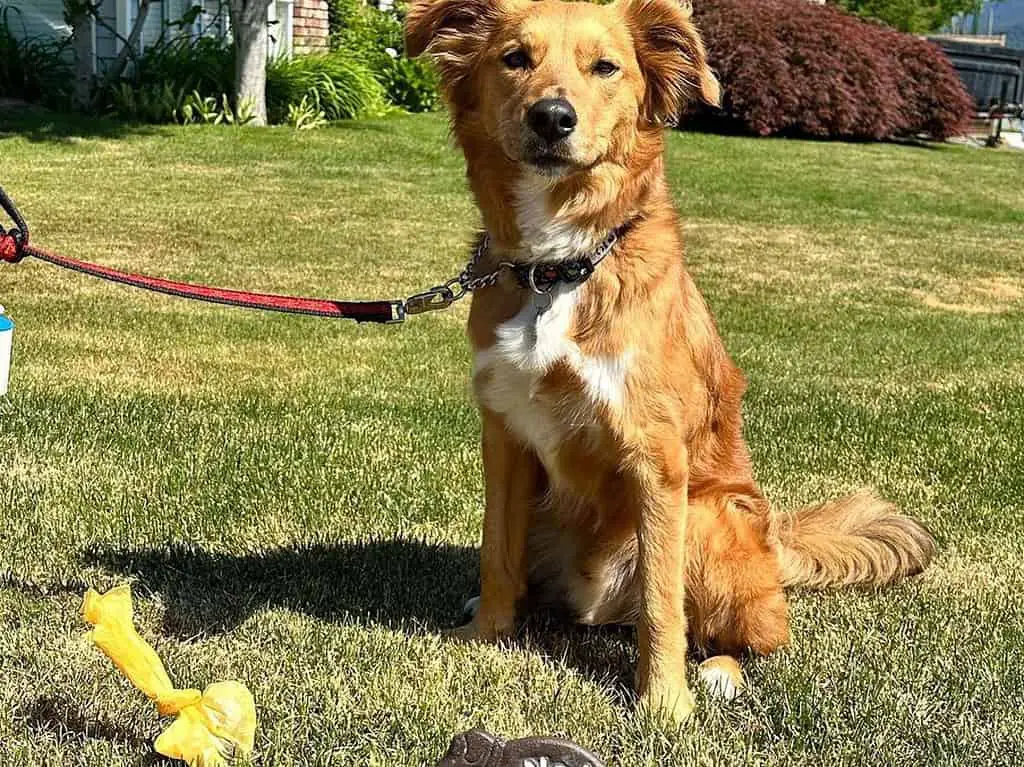Dealing with dog poop — the not-so-desirable aspect of being a pet parent. From walks to finding your pup’s deposit on your precious carpet, learning how to manage poop is an unavoidable part of owning a dog. But have you ever wondered just how long your furry friend can hold it in?
We have an undeniable advantage over our pups, thanks to the convenience of indoor plumbing. As such, our dogs rely on us to take them outside for necessary bathroom breaks. Unfortunately, as is often inevitable in life, there can be circumstances wherein this regular task may not be achievable on a timely basis. Can they hold it in for hours? Days?
This article covers everything you need to know about how long can a dog hold its poop.

The Importance of Knowing Your Dog’s Poop Schedule
It is essential to be aware of your dog’s defecation schedule to keep track of their health, effectively teach them appropriate restroom habits, clean their living space, prevent any messes that may arise from unwanted elimination, and provide relevant data for your veterinarian.
Your dog’s optimal health and well-being depend on regular defecation on an established schedule. Please take note of any shifts or differences in their bowel movements, such as diarrhea or constipation, which may indicate a greater underlying medical issue. Early diagnosis and immediate treatment can prevent many potential issues from developing further.
Secondly, house training your dog is a critical process requiring observing their bathroom habits. You should pay particular attention to puppies and their set routine; they may need to go outside more regularly than older dogs, and having an established schedule can reduce the length of the potty training period significantly. Anticipating when your pup needs to relieve themselves is necessary for them to learn where it’s appropriate for them to do so, expediting the house training experience.
Be mindful of your pet’s poop schedule to help maintain a healthful living environment. Being aware of when your dog needs to defecate allows you the necessary preparation, such as having waste disposal bags on hand and easy access to potential areas for dumping. Not only does this keep the immediate area tidy, but it also adds significantly to the cleanliness of public parks and residential streets.
Knowing the frequency of your dog’s bowel movements can help avoid accidents and discomfort for you and your pet. Recognizing their routine allows you to plan walks and other activities; this way, you can provide them ample opportunity when they need to answer nature’s call. This can not only minimize messes occurring inside the residence but also eliminate problematic scenarios while outside in public areas.
Maintaining a record of your dog’s excretion habits can be beneficial when presenting data to your veterinarian. Be mindful of irregularities that may indicate an underlying medical condition, sudden fluctuations in frequency, as well as alteration in the color or consistency of the feces, and signs of parasites or blood should all be reported to the vet. Doing so will ensure they can make a precise diagnosis and suggest an effective treatment.
Understanding the Range: Average Time Dogs Hold Their Poop
Healthy adult canines can typically suppress their elimination processes for approximately 8-10 hours. Nevertheless, this window of time can differ greatly; depending on how extensively the animal has been conditioned with respect to holding its defecation or if a large capacity bladder is present, it may be able to extend the duration to complete 12 hours. On the other hand, in dogs who have not been fully housetrained alongside those that do not follow a set schedule tend to experience difficulties when abstaining from going potty.
The size of a dog’s colon plays an important role in its ability to wait for designated times for bathroom breaks. Generally speaking, colons of larger breeds can store more waste, resulting in extended periods between defecation. Physical attributes affect how much time each dog can withhold their bowels, metabolism speed, and overall digestive system health. While some dogs can metabolize food rapidly, causing them to go out the same number or more times than smaller animals, others may possess slower digestion processes permitting them additional time before needing outdoor visits.
Puppies have less developed bladders and sphincter muscles, resulting in a need to eliminate more often. Likewise, aged dogs or those with health complications may also have reduced bladder control and thus require more frequency relieving themselves than average.
Factors That Affect a Dog’s Ability to Hold Its Poop
The diet also plays a crucial role in the regularity of a dog’s bowels. A fiber-rich diet can heighten consistency and relinquish more extended periods between defecation. On the other hand, an inadequate amount of fiber in their day-to-day meals may cause loose fecal matter and demand frequent relief trips to the toilet.
It is vital to acknowledge that individual canines may exhibit varied restroom routines. Although certain breeds, sizes and amounts of exercise will impact a canine’s bowel movements, some dogs possess maximum restraint and can withhold their poop for expanded periods, while others may feel a more pressing impulse to relieve themselves.
Owners should pay attention to their dog’s needs and establish an appropriate routine ensuring regular bathroom breaks. Experts recommend administering two opportunities to eliminate waste daily, especially immediately after meals and first thing in the morning. Ignoring these requirements can lead to discomfort, indoor accidents, or more severe health conditions.
Signs That Your Dog Needs to Go
Be aware of the signals that your dog needs to defecate for successful toilet training methods to take place, as well as to preserve their general health. Some specific cues will help you anticipate when your furry companion requires a restroom break.
A prominent indicator of a dog’s outdoor requirement is heightened agitation or continual pacing. If your pup begins roaming around the residence without purpose or persists in going to the doorway, it could indicate that they need to go outside.
Dogs have an instinctual drive to maintain a clean environment, demonstrated by their tendency to sniff the ground or circle in a chosen area before defecating. This is likely due to their natural preference for excreting waste away from living and eating areas. Therefore, these actions signify that they are assessing the site of elimination to decide if it is appropriate for this purpose.
Dogs demonstrate unique sniffing behavior that differs depending on factors including breed, personality, and individual life experiences. Some dogs may require a longer investigation, while others may walk away after a brief inspection. Variations in this behavior can be seen among different dog breeds.
Dogs may express signs of distress, including vocalizations, such as whining or barking, and scratching at the door that signals their immediate need to eliminate. Additionally, some dogs will adopt a hunched posture which typically indicates they are about to relieve themselves.
Paying close attention to your pet’s bodily movements is essential to recognize when they require relief. Often, pets will act in a manner that combines multiple indicators or may exhibit their unique behaviors when it comes time for them to defecate. Understanding these signifiers and responding quickly will ensure your dog can comfortably poop without discomfort or inconvenience.
Consequences of Holding in Poop for Too Long
If a dog is restraining their natural urge to defecate for an extended period, there can be negative impacts, both in the short and long run. One of the immediate repercussions is discomfort and agony. When a dog inhibits its natural desire to eliminate, poop piles up in the colon, leading to intensified pressure and bloating of the intestine. This often leads to distress for the pet, resulting in restlessness and anxiousness due to abdominal pain.
In addition to unease, repressing a bowel movement can additionally induce constipation. When the stool lies dormant in the colon for an extensive amount of time, the colon extracts excessive amounts of water from it; this causes the poop to become harder and drier. This newly formed gritty consistency makes elimination difficult when defecation occurs eventually. Constipation may lead to straining throughout excretion, thus inducing rectal bleeding along with continued discomfort for the dog.
Furthermore, when a dog withholds bowel movements for an extended period, there may be a buildup of feces in the colon that can become lumped together. This is known as impacted feces, and it can create blockages leading to extreme constipation and potentially necessitating medical treatment to remove the obstruction.
Habitual withholding of feces can lead to long-term adverse effects. Chronic constipation elevates the chances of megacolon developing, which dilates and weakens the colon’s contraction capacity. This amplifies existing difficulties in regular defecation for a dog.
It is also important to note that dogs who hold in pooping for an extended time can be at a higher risk of acquiring urinary tract infections. The rectum and the urinary tract are placed close together in dogs, and the pressure that may arise from excrement retention can disrupt typical urinary activity. The promotion of bacteria growth near this area has been linked to infections, creating uneasiness, and pain and potentially requiring veterinary intervention.
Besides the physical consequences, dogs may become agitated or restless as they attempt to contain their excrement. In the long term, it could impact their general disposition and cause behavioral issues such as aggression or destruction.
Tips to Help Your Dog Maintain a Healthy Poop Schedule
Here are some tips to help your dog maintain a healthy poop schedule.
- Providing your dog with healthy food. Feeding your dog at defined intervals daily facilitates the regulation of digestion and encourages regulated defecation. Make sure to offer an adequate diet that befits your pup’s age, size, and breed. High-quality dog food containing suitable fiber and nutrients can foster positive gastrointestinal health and result in regular bowel movements.
- Adequate hydration is essential to sustaining a regular defecation pattern. You should always guarantee your dog has access to new, uncontaminated water. Consistent fluid consumption will moisten the feces and impede constipation, facilitating frequent bowel movements for your dog.
- Incorporating physical activity into a dog’s routine is essential for their health and ability to digest food safely. By exercising, the digestive system will be promoted and support the properly eliminating waste products. To maintain a balanced digestive system, owners should provide their dogs with regular walks, playtime, and other activities that get them moving regularly.
- Ensure your dog remains in a stress-free setting. When they are under excess tension or express apprehension, it can cause disturbances in their digestive system, resulting in abnormal bowel movements. Evaluate their living space and locate any sources that could induce distress. Offer them an environment where they feel secure and provide them with proper physical and cognitive exercises to reduce their level of anxiety.
- Dispose of your dog’s waste properly and immediately. This will promote a clean environment and avert the transmission of parasites and bacteria, which can be hazardous to your dog’s safety and the surrounding ecosystem.

- It is highly recommended to regularly observe your dog’s stool for any changes in color, texture, or frequency, as these can indicate a shift in their digestive health. In the event of sudden changes, immediate veterinary attention should be provided. It is essential to ensure regular check-ups with the vet so that potential digestive health issues may be identified quickly and properly managed.
- Besides abiding by these guidelines, a veterinarian may advise utilizing dietary supplements or probiotics. This may help maintain a healthy gut flora and aid in the digestive process for the dog.
- Finally, schedule regular check-ups with your veterinarian to ensure your dog’s well-being is not jeopardized. During these visits, the dog’s general health and digestive system can be evaluated, along with dietary suggestions and treatments for any possible underlying medical conditions that may disrupt normal pooping patterns.
The Bottomline On How Long Can A Dog Hold Its Poop
Variables such as age, health, diet, and a dog’s exercise routine will influence the length of time it can go without pooping. Generally speaking, puppies lack control over their bowel movements; hence, they require excreting more regularly every 4 hours. In contrast, as dogs mature, they have better power to hold their poop for extended periods, but not more than 24 hours.
Ultimately, you should not force dogs into holding their defecation for longer than they are comfortable with. Different digestive systems and varying needs should be respected, as in humans, and allowing the dog to extend its period without relieving itself can lead to discomfort, a disorder of the digestive system, or even cause more serious health problems like constipation. To ensure the well-being of our four-legged friends, provide regular opportunities for bathroom breaks, especially during the day.




